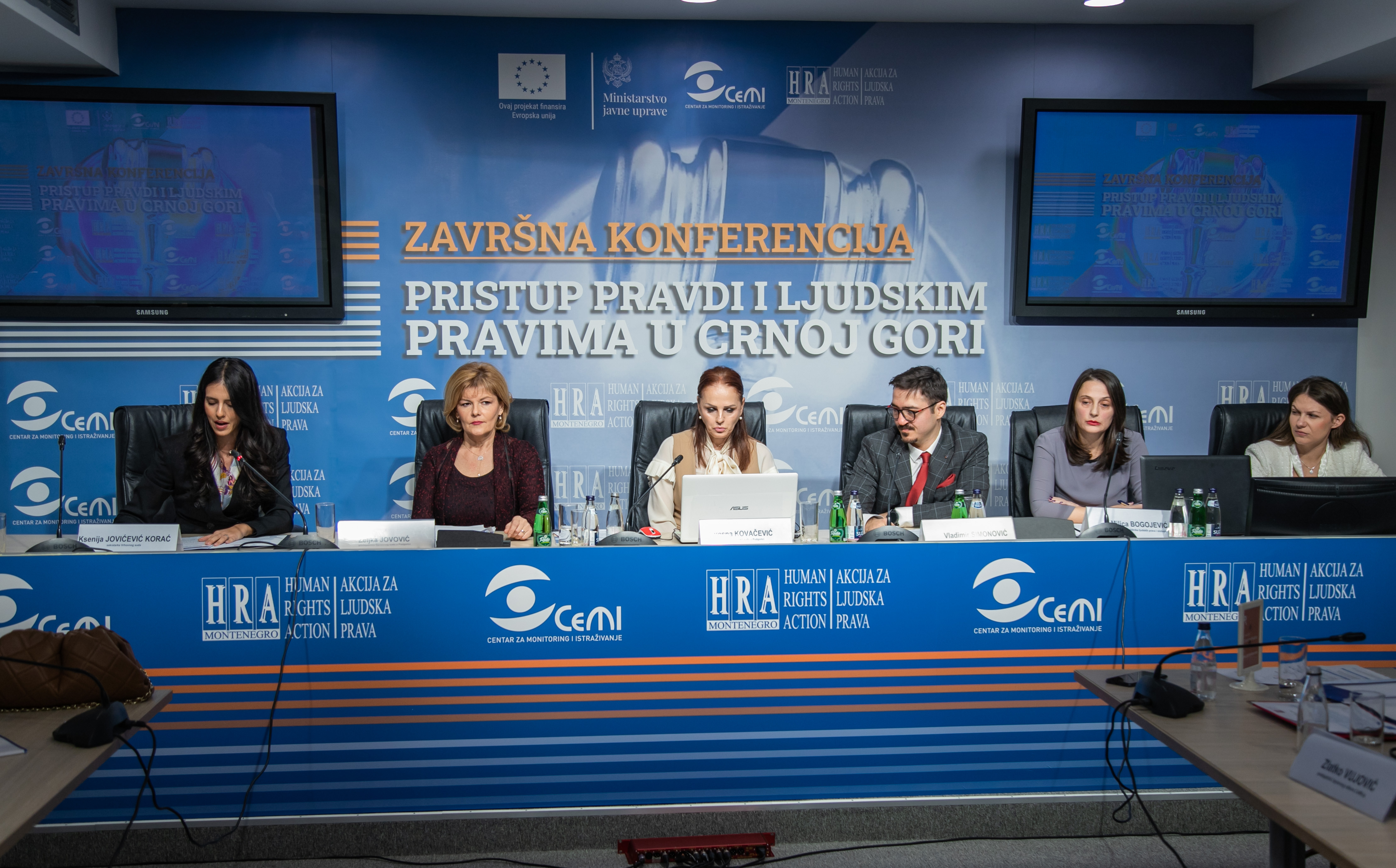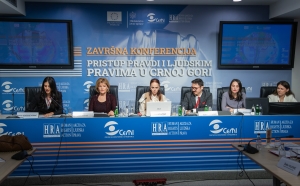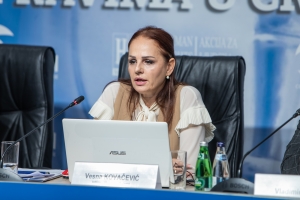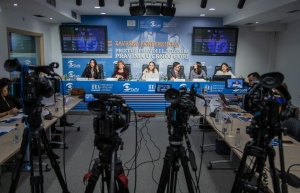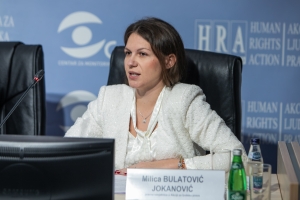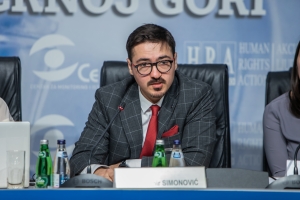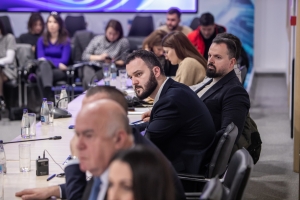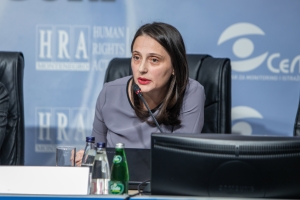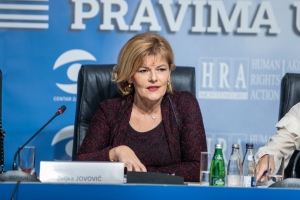"The judicial system of Montenegro has been facing numerous challenges for years, limiting its ability to effectively serve the public interest. Key to this is that the Judicial Council should not delay the process of evaluating candidates and making decisions about their appointments in the upcoming period. This was stated during the panel discussion 'Access to Justice and Human Rights in Montenegro – Trial Monitoring Project Results,' as part of the final conference organized by the Center for Monitoring and Research (CeMI)."
The head of the Legal Department at CeMI, Vladimir Simonović, emphasized that the functionality of the judiciary has been compromised due to the untimely filling of vacant judicial positions. 'During visits and discussions with court presidents, we consistently received information that the lack of human resources hinders the effective functioning of the courts. Two main factors stand out as contributing to this problem. The first factor is the 18-month duration of judge training, which further complicates filling vacant positions. The second crucial factor is the method of assigning judges. A small number of potential candidates are willing to work in courts in the north, and this becomes particularly problematic for candidates who do not come from those cities,' explained Simonović. He stated that the key recommendation is for the Judicial Council not to delay the process of evaluating candidates and making decisions about their appointments in the upcoming period. He also urged the government to promptly reconsider the Proposal for Amendments to the Law on the Judicial Council and Judges.
"Certain deadlines are insufficiently respected by the courts. The deadline for scheduling hearings for indictment control was not observed in more than half of the analyzed cases, while the deadline for scheduling the main trial after confirming the indictment was not respected in close to one-third of the analyzed cases," explained Simonović. He added that the problem of postponing main trial hearings was particularly pronounced, with more than half of these hearings being delayed. "Among the numerous factors contributing to the postponement and prolongation, we noticed that it often involves the absence of the accused," said Simonović.
Milica Bulatović Jokanović, Legal Advisor at the Human Rights Action (HRA), cited the example of the Basic Court in Danilovgrad, which was without a judge for over half a year, influenced by the fact that the Judicial Council had not selected a candidate for the judge, and had not assigned them for more than five months. 'In addition to personnel problems, the issue of developing and implementing a new Information System remains unresolved. Also, not much has been done to implement the Action Plan from 2019 within the framework of the Judicial Reform Strategy. In the courts, we have a small number of brochures distributed to citizens for free legal aid. These brochures should be published on the websites of both the Ministry of Justice and the courts,' said Bulatović Jokanović. She believes that complaint boxes should be installed in all courts for complaints and objections to the work of judges and state officials and employees, following the example of the Basic Court in Nikšić.
"At the Basic Court in Žabljak, people with disabilities have no means of access to the building since there is no elevator. The most favorable situation is in Kotor. When it comes to spatial capacities, most judges hold court in offices. We have proposed the construction of a Palace of Justice, and we hope that this will happen in the near future," said Bulatović Jokanović. Regarding the security of the courts, she indicated that a series of measures need to be taken, and solutions should involve equipping all courts with functional metal detectors and scanners. "Rigorous supervision of the implementation of measures for bringing items into main trials should be established. Authorities should also quickly identify and prosecute individuals responsible for anonymous reports of placing explosive devices, and the most important issue, namely the storage of criminal case files, should be addressed," explained Bulatović Jokanović.
"The hearing should be scheduled 15 days from the day of receiving the indictment in court, and this deadline was adhered to in only 45 analyzed cases, while it was not respected in as many as 56. Regarding the basic courts, the longest delay occurred in the Basic Court in Kotor. The time between receiving the indictment and scheduling the hearing was 83 days, and in the Basic Court in Bar, it was 55 days. In the Higher Court in Podgorica, there were two cases that took just over four months, and in the Higher Court in Bijelo Polje, it was around four months," said Bulatović Jokanović. As for the main hearing, they attended 231 hearings in 196 cases and observed certain violations of the right to defense. She also added that they recorded three cases of abuse. Bulatović Jokanović stated that the second-instance proceedings, based on appeals against the decisions of the basic courts, lasted an average of 109 days, and based on appeals against the decisions of the higher courts, it was 103 days.
Vesna Kovačević, Judge in the Higher Court in Podgorica agrees that Montenegro's judicial system has been facing numerous challenges for years, limiting its ability to effectively serve the public interest.
"The functionality of the judiciary in Montenegro is jeopardized due to the untimely filling of vacant judicial positions, which has compromised efficiency. Additionally, I would point out the deficit of political will to pass key laws in the field of justice, so all these problems not only harm the rights of citizens seeking justice but also understandably diminish their trust in the judicial system," emphasized Kovačević.
She mentioned having seven judges handling 140 to 150 cases, and they are unable to conclude both inherited and newly assigned cases.
"As for spatial capacities, I must emphasize that in the civil department, two judges share one office. These are not adequate conditions, and it happens that when courtrooms are occupied, we end up holding trials in offices, resulting in defendants and plaintiffs being at an inappropriate distance, and we cannot accommodate the public or journalists," said Kovačević.
According to her, judges should adjudicate and manage their cases, while other authorities should ensure their independent work and guarantee security.
"All European and world standards prescribe that courtrooms cannot contain items subject to criminal execution. We have repeatedly appealed for these items to be moved from the building of the Higher Court in Podgorica to a suitable location, but it's all a dead letter on paper, and these items are still with us," explained Kovačević.
She explained that the legal deadline for confirming the indictment is 15 days. However, due to a large number of defendants, complex and extensive evidence in the case, lawyers sometimes cannot read a 200-300 page indictment within that time frame and request a postponement.
The President of the Basic Court in Podgorica, Željka Jovović, stated that the judges of this court worked at the Law Faculty and the Judges' Education Center to ensure the continuity of the work process and efficiency.
"The largest number of cases are precisely before the Basic Courts in Podgorica, and that is why 199 cases before our court were monitored. You have seen that the offices and the entire building of the Basic Court in Podgorica do not provide conditions for trials and adequate work. In the previous period, we provided six offices for judges to work," said Jovović.
The report noted that four judges are missing, and as she mentioned, in four years, 19 judges left the court due to transferring to other positions. In 2022 alone, nine judges left the court.
"The deadline for scheduling the main hearing in indictments is 37 days, and this deadline is respected. As for the postponement of hearings in the observed cases, it is very concerning that as much as 63% of hearings were postponed," emphasized Jovović.
Regarding individuals in the Montenegro Correctional Center (ZIKS), she stated that they all give positive ratings for doctors and food, with the only complaint being about the overcrowding of the prison, but nothing has been done in that direction yet.
Jovović mentioned that today they have only 110 requests for free legal aid, with very few of those who should be applying.
The Chief Advisor of the Protector of Human Rights and Freedoms, Milica Bogojević, stated that the report supports the assessments, conclusions, and recommendations of the Ombudsman, which are noticeable in cases of procedural delays and relate to issues of court procedure management, organization of court work, and slow selection of judges.
"The problems have been recognized by the UN Special Rapporteur, who visited Montenegro, and these cases are registered in the preliminary report, with the final report expected in June," said Bogojević.
She mentioned that Montenegro is one of the few countries with a provision in procedural legislation, Article 185, which implies judicial oversight for detention, considering it a good legal preventive measure in terms of all the rights individuals enjoy according to United Nations standards.
"As for legal aid, I must emphasize, especially regarding victims of torture, that amendments to the Law on Free Legal Aid have been adopted, which we proposed and concern the harmonization of the concept of victims with the UN Convention against Torture," said Bogojević.
The conference is part of the project "Access to Justice and Human Rights in Montenegro - Trial Monitoring Project 2021-2023," conducted by CeMI in cooperation with the Human Rights Action (HRA), funded by the European Union, co-financed by the Ministry of Public Administration of Montenegro.
